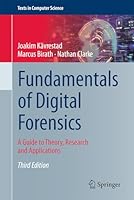
Network Forensics: Tracking Hackers through Cyberspace
- Length: 576 pages
- Edition: 1
- Language: English
- Publisher: Prentice Hall
- Publication Date: 2012-06-23
- ISBN-10: 0132564718
- ISBN-13: 9780132564717
- Sales Rank: #252023 (See Top 100 Books)
“This is a must-have work for anybody in information security, digital forensics, or involved with incident handling. As we move away from traditional disk-based analysis into the interconnectivity of the cloud, Sherri and Jonathan have created a framework and roadmap that will act as a seminal work in this developing field.”
– Dr. Craig S. Wright (GSE), Asia Pacific Director at Global Institute for Cyber Security + Research.
“It’s like a symphony meeting an encyclopedia meeting a spy novel.”
–Michael Ford, Corero Network Security
On the Internet, every action leaves a mark–in routers, firewalls, web proxies, and within network traffic itself. When a hacker breaks into a bank, or an insider smuggles secrets to a competitor, evidence of the crime is always left behind.
Learn to recognize hackers’ tracks and uncover network-based evidence in Network Forensics: Tracking Hackers through Cyberspace. Carve suspicious email attachments from packet captures. Use flow records to track an intruder as he pivots through the network. Analyze a real-world wireless encryption-cracking attack (and then crack the key yourself). Reconstruct a suspect’s web surfing history–and cached web pages, too–from a web proxy. Uncover DNS-tunneled traffic. Dissect the Operation Aurora exploit, caught on the wire.
Throughout the text, step-by-step case studies guide you through the analysis of network-based evidence. You can download the evidence files from the authors’ web site (lmgsecurity.com), and follow along to gain hands-on experience.
Hackers leave footprints all across the Internet. Can you find their tracks and solve the case? Pick up Network Forensicsand find out.
Table of Contents
Part I: Foundation
Chapter 1 Practical Investigative Strategies
Chapter 2 Technical Fundamentals
Chapter 3 Evidence Acquisition
Part II: Traffic Analysis
Chapter 4 Packet Analysis
Chapter 5 Statistical Flow Analysis
Chapter 6 Wireless: Network Forensics Unplugged
Chapter 7 Network Intrusion Detection and Analysis
Part III: Network Devices and Servers
Chapter 8 Event Log Aggregation, Correlation, and Analysis
Chapter 9 Switches, Routers, and Firewalls
Chapter 10 Web Proxies
Part IV: Advanced Topics
Chapter 11 Network Tunneling
Chapter 12 Malware Forensics

Creating NPM Package: Your React JavaScript Guide to Create, Test, and Publish NPM Libraries






